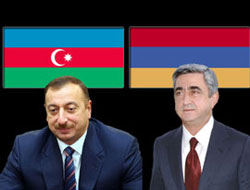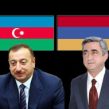
Karabakh Peace Prospects Uncertain After Latest Armenian-Azeri Talks
Publication: Eurasia Daily Monitor Volume: 6 Issue: 145
By:

Prospects for the resolution of the Karabakh conflict look more uncertain following the latest round of negotiations between the presidents of Armenia and Azerbaijan. Contrary to the international community’s expectations, Presidents Serzh Sarksyan and Ilham Aliyev appear to have failed to clear the remaining hurdles to sign an Armenian-Azerbaijani peace accord that would have far-reaching implications for the entire region. International mediators hope that the two leaders will achieve a breakthrough at their next meeting expected this fall.
Sarksyan and Aliyev met in Moscow on July 17 for the sixth time in just over a year to try to build on significant progress that was apparently made during their two previous meetings in Prague and St.Petersburg on May 7 and June 4 respectively. U.S., Russian and French mediators expressed hope that in Moscow they would resolve their remaining disagreements over the "basic principles" of a Karabakh settlement put forward by the OSCE’s Minsk group. Deputy-Assistant Secretary of State Matthew Bryza, the group’s U.S. co-chair, said that would enable the conflicting parties to agree to a framework peace deal "by the end of the year" (Reuters, June 22).
On July 10 the United States, Russia and France, all of which co-chair the Minsk group, underscored their renewed optimism concerning a possible settlement of the Karabakh issue in a joint statement issued by their presidents on the sidelines of the G8 summit in L’Aquila, Italy. "We urge the presidents of Armenia and Azerbaijan to resolve the few differences remaining between them and finalize their agreement on these basic principles, which will outline a comprehensive settlement," the statement said.
Neither Aliyev nor Sarksyan made any public statements on July 17 after several hours of discussions, partly attended by Bryza and his fellow negotiators from Russia and France. The mediators told journalists afterwards that the meeting did not live up to their expectations (www.tert.am, July 18). According to Yuri Merzlyakov, the chief Russian negotiator, the two presidents held a more productive meeting with their Russian counterpart, Dmitry Medvedev, the next day. "There are interesting solutions which the presidents found in the trilateral format," Merzlyakov told the Azerbaijani Trend news agency on July 22. "I think that this could produce a positive result in the future."
Sarksyan likewise spoke of "progress" in the negotiating process as he received Sweden’s Foreign Minister Carl Bildt in Yerevan on July 20 (Statement by the Armenian presidential press service, July 20). Azerbaijani officials’ reaction to the Moscow talks was contradictory. Foreign Minister Elmar Mammadyarov’s cautious optimism contrasted with statements made by Novruz Mammadov, Aliyev’s chief foreign policy aide. Mammadov accused the Armenian side of showing "hypocrisy" and scuttling the long-awaited agreement (Zerkalo, July 23).
The Minsk group co-chairs, meanwhile, began preparations for the next Aliyev-Sarksyan encounter, which they hope will take place in early October on the sidelines of a CIS summit in Moldova. In a joint July 21 statement, they said they will also start working on an "updated version" of their basic principles.
The proposed framework agreement became the basis of Armenian-Azerbaijani talks before it was formally submitted to the parties in Madrid in November 2007. Aliyev and Sarksyan’s more hard-line predecessor, Robert Kocharian, came very close to accepting it in early 2006. The so-called Madrid principles, disclosed in general terms by the mediating powers, call for a phased settlement of the Karabakh conflict that would start with a gradual liberation of the seven districts in Azerbaijan which were fully or partly occupied by Karabakh Armenian forces during the 1991-1994 war. In return, Karabakh’s predominantly Armenian population would determine the disputed enclave’s status in a legally binding referendum. The would-be agreement stipulates that Karabakh would remain under an internationally recognized Armenian control until the two sides set a date for holding such a vote.
According to U.S. and Armenian officials involved in the peace process, Aliyev has essentially agreed to this formula despite his constant public assertions that Baku will never come to terms with the loss of Karabakh. Accordingly, some highly-placed Armenian sources claim that the main sticking point in the talks (both under Kocharian and now) relates to Armenian withdrawal from Kelbajar and Lachin, the Azerbaijani districts wedged between Karabakh and Armenia. The Kocharian administration, they argue, insisted that these territories should be returned to Azerbaijan only after the Karabakh referendum on self-determination, something which was unacceptable to Baku. Also, while agreeing to ensure unfettered transport communication between Armenia and Karabakh through a 30-kilometer-wide corridor, the Azerbaijani side rejected Armenian demands for that overland link to be formally incorporated into Karabakh.
There have been some indications that Sarksyan could show greater flexibility on these issues. In an interview with the Russian Vesti TV channel on June 20, Aliyev said that Kelbajar and most of Lachin would be placed under Azerbaijani control five years after the Armenian pullout from the other occupied lands surrounding Karabakh. However, their failure to finalize the peace accord in Moscow might mean that Yerevan insists on the referendum linkage. Mounting uproar from Armenian nationalist groups opposed to any territorial concessions to Azerbaijan preceded these talks.
One of these groups, the Armenian Revolutionary Federation (ARF, also known as the Dashnak Party), organized a conference of like-minded hard-line forces in the Karabakh capital Stepanakert on July 10-11 to warn the Yerevan government against signing up to the Madrid principles (Yerkir-Media TV, July 11). Karabakh Armenian leaders also attended the high-profile gathering, again exposing their reluctance to embrace the proposed settlement. Even Armenia’s first President Levon Ter-Petrosian, who was forced to resign in 1998 after advocating a similar deal with Azerbaijan, is not averse to exploiting the issue in his continuing standoff with the ruling regime. In a July 14 statement, Ter-Petrosian’s Armenian National Congress alliance cited "dangerous" developments in the Karabakh peace process to again demand Sarksyan’s resignation.
Sarksyan also has to reckon with Kocharian’s opinion. The latter would hardly approve of Armenian concessions to Azerbaijan and, despite keeping a very low profile, might wield more influence than the Armenian opposition to undercut his successor and longtime ally. Sarksyan, who is still reeling from the 2008 post-election unrest in Yerevan, will thus need to tread a delicate line in the months ahead.




